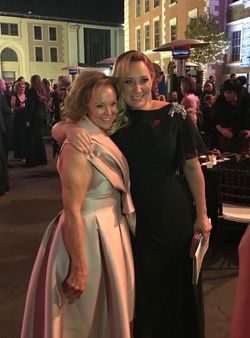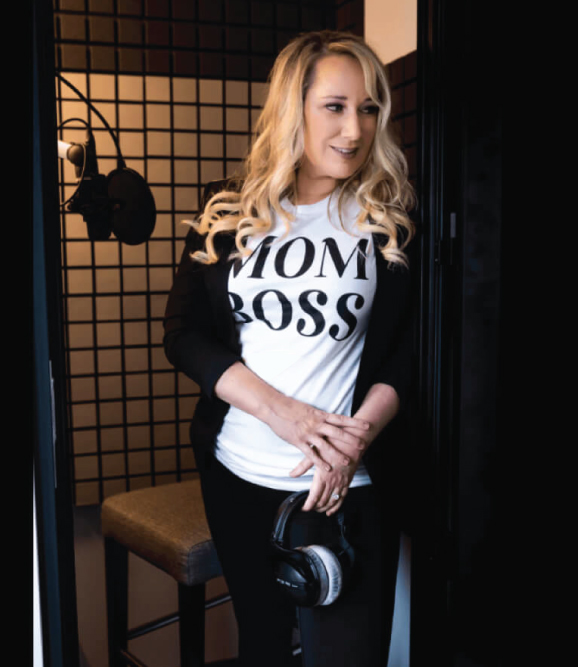Let’s face it. Female voice actors are still underrepresented in many areas of voice over. One of the genres where this is especially obvious is promo. Think about it – when was the last time you heard a female voice narrating a movie trailer? Or a major network television promo?
My recent experience at the Society of Voice Arts and Sciences (SOVAS) Voice Arts Awards taught me a lot about being a female in voice over, the challenges that we face, and the ways that we can start bridging the gap. In this post, I’d like to share what I learned, and tell you about how I met an extraordinary female voice actor named Debbe Hirata.
Female voice actors pave the way for each other

Everyone has a guilty pleasure, and mine is the television show Claws on TNT. It’s the juiciest, most beautifully done show. It’s all kinds of raw and “oh no they didn’t”, and I just love it. Late one night, I was watching an episode and they had a promo. “Coming up on…Claws…on TNT”…and the woman’s voice was absolutely perfect. She sounded like she smoked six packs a day, and she couldn’t have done a better job of capturing the mood of the show. That voice belonged to Debbe Hirata, an extremely successful, award-winning voice actor.
When I was nominated for a SOVA award for my promo demo reel, I looked up past nominees in the same category. The SOVAS have been around for five years, and in the first year of the awards there were three people nominated in the Outstanding Promo Demo Reel category: Dr. Sue Holstein, Mitch Phillips, and…Debbe Hirata. The next year, the nominees were all men. The year after that, same thing – all men. Fast forward four years and there hadn’t been another female nominee, until me.
I decided to send Debbe a message and introduce myself. I told her how much of a fan I am, how much I love Claws, and I told her about my nomination. Then, at the SOVAS award ceremony, I actually got to meet her. Debbe couldn’t have been more of a gracious, humble, and generous person. She was supportive and encouraging, offered to help me in any way she could, and told me about what building a career as a female voice actor has been like for her.
What I learned from this experience is that females who are breaking new ground are doing it not only for themselves, but for every female who will come after them. If Debbe hadn’t achieved as much as she had in the voice over industry, I probably wouldn’t have even been nominated. I am very grateful to her, and to other pioneering female voice actors, like Melissa Disney, who was the first female to ever voice a movie trailer (for Gone in Sixty Seconds). Recognizing how much of an impact other female voice actors have had on my own career makes me want to pay it forward!
So why aren’t there more female voice actors in promo?
The reality is that promo voice over is still a field that is dominated by men, and remains hard for a woman to break into. Of the voice actors who are represented by management agencies specializing in promo, women are an extremely small minority. The research on the perception of male and female voices may offer clues as to why this is the case. In a study of 320 subjects who listened to the word “hello” recorded from a total of 64 individuals, the perceived attractiveness of the voice was associated with different personality traits depending on the gender of the speaker. Female voices that were rated as attractive were associated with warmth, trustworthiness, and likability, whereas attractive male voices were associated with strength and dominance. Interestingly, these ratings were consistent across both male and female listeners.
These findings might shed light on how male and female voices are cast. Depending on the goal of the voice over, the gender of the actor may be chosen in order to provoke a specific reaction in the audience. For example, computer voices (like Apple’s Siri, Amazon’s Alexa, or Microsoft’s Cortana) tend to be female, potentially in order to signal to the user that their digital assistant is trustworthy, helpful, and friendly. (One counter-example is from the 1990s in Germany, when BMW had to scrap the female voice in its navigation system because men there reported that they wouldn’t take directions from a woman.)
In promo, the goal of the ad is to persuade the audience to watch the show or tune in to the broadcast. Male voices, being associated with strength, may be seen as more confident and convincing, and therefore more likely to influence the behavior of the listener. Another factor that may contribute to the lack of female voices in promo is the perceived risk of breaking from male-dominated tradition. Audiences are used to hearing male voices in promo, and studios prefer to “play it safe” by avoiding the unexpected female voice.
A brighter future for female voice actors in promo
How do female voice actors break the glass ceiling in promo? The good news is that there is already a shift in the right direction. Networks are changing (albeit slowly) and are starting to see the benefit of having females voice their promos. Pioneering voice actors like Debbe Hirata and Melissa Disney have paved the way for other female voice talent (including myself) to get opportunities they otherwise probably wouldn’t have. And growing support within the community of female voice actors is continuing to encourage more women than ever to go for it – no matter what the odds!
